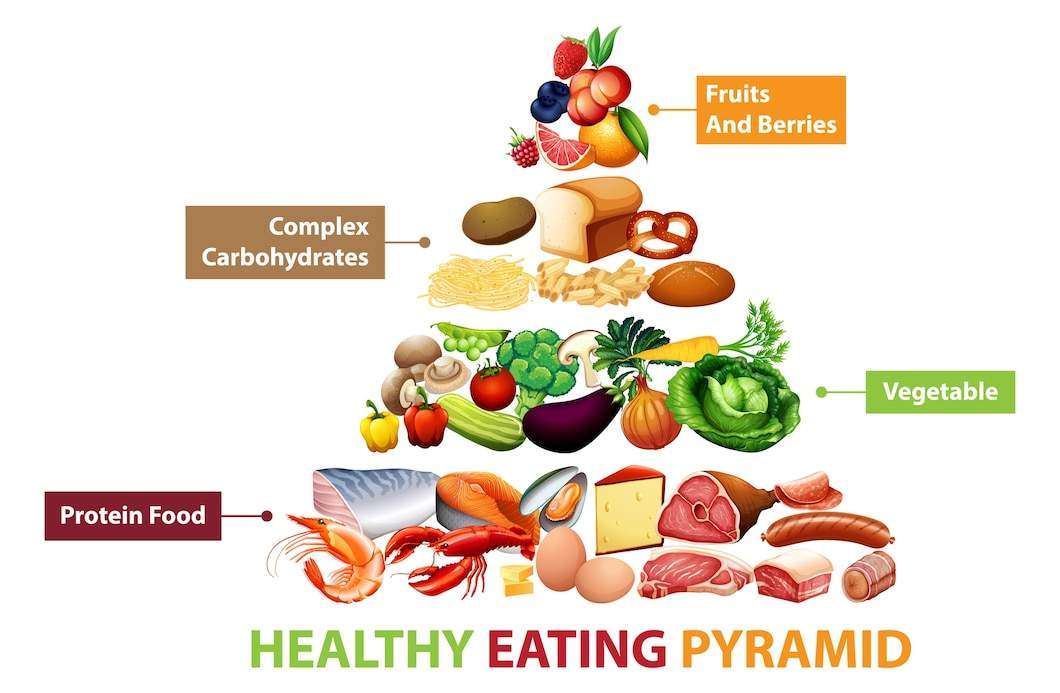Introduction
Diet and nutrition plays the role of maintaining a good health and preventing illnesses. The nutrition facts state that complete diet comprises of a balanced consumption of carbohydrates, fats, proteins, vitamins, minerals and fibre. These nutrients are essentials for optimal health, energy for daily activities, promotion of growth and development, immune function, management of weight and appropriate mental health. An adequate nutrition notably includes a variety of nutritional foods along with appropriate portion sizes, food preparation methods, and practicing food safety measures. Appropriate food choices and a healthy eating plan can help reducing the risk of numerous chronic health conditions, heart health, diabetes and certain cancers.
I. The importance of nutrition
 Balanced diet
Balanced diet
Diet is a crucial element our daily life for maintaining optimum health. A nutritious diet provides required energy for our daily activities, promotes adequate growth and development, boosts the immune system for fighting infections, maintains healthy weight and reduces the risk of depression, and anxiety, thereby promoting mental health. A healthy diet must comprise of all the essential nutrients, and minimal amount of saturated and transfers, cholesterol, salt, and sugars. It must have more of fruits, vegetables, whole grains, lean meats, healthy fats and eggs.This article will present the importance of nutrition in our daily lives, its impact of daily diet, micro and macronutrients, water and healthy dietary choices.
II. The Fundamentals of Nutrition
Nutrition explains how the human body utilises the nutrients from the foods to maintain health, growth and well-being. Proper nourishment helps the body in all round development and prevent from various health problems. Adequate nutrition for our body consists of macronutrients and micronutrients. Macronutrients are large amount of nutrients required for our body. Micronutrients are referred to small amount of nutrients which are essential for the human body functioning.
The three main macronutrients are carbohydrates, proteins and fats.
Carbohydrates: The carbohydrates are the main source of energy of the body. Carbohydrates regulate the blood sugar levels and provide fibre for digestive health. It is classified into three main types, such as the sugars, starches and fibres.
Sugar is a simple carbohydrate and is easily digested and absorbed. It is found naturally in fruits, milk and vegetables. It is also available in processed foods, such as candy, soft drinks, cakes, sweets and other similar food items. Starch is complex carbohydrates and take sometime to digest. It can be found in rice, chapatti, bread, pasta, potatoes and other vegetables. Fibre cannot be digested and plays an important role in the bowel movement of the digestive system. It is found in fruits, vegetables and whole grains.
Proteins: Proteins are called the body building foods. Proteins are essential for structure and functioning of the human body. They are found throughout the body, such as the muscles, bone, hair or any other tissues. It powers the enzymes required for different body functions. Proteins play different roles in the body. These include the roles of enzymes, hormones, receptors, structural functions and transport molecules.
Fats: Though everybody wishes to cut down fats from the diet plate in today’s world, it is an important source of energy. It is essential consume fats in moderation. Fats are the human body’s long term storage of energy. It is stored in the adipose tissue and serves as a reserve fuel at times of insufficient food intake.
It acts as an insulator and protect the inner organs from injury. Fats are essential for the maintenance of cell structure and functioning. It helps in the secretion of certain hormones and fats are essential for the absorption of the fat soluble vitamins (A, D, E and K).
Despite of its importance in the human body, it is necessary to consume fats in moderation. Consuming too much fats leads to obesity and different health issues.
It is necessary to choose fats for healthy sources. These include Monounsaturated fats (from avocado, olive oil, nuts and seeds), polyunsaturated fats (from fatty fish, walnuts, flaxseeds and vegetable oil). omega-3 fatty acids (from fatty fish, walnuts, flaxseeds, chia seeds) and plant based fats (from nuts, seeds and avocados).
The mono and poly unsaturated fatty acids help to lower low density lipoproteins (LDL), reduce the risk of heart diseases and reduce inflammation.
The omega-3 fatty acids are essential for brain function and lower the risk of heart disease, stroke and many other chronic health conditions. The plant based fats consist of fibre and antioxidants, which reduces the risk of certain diseases.
The micronutrients include vitamins and minerals. These are required in very small amounts by the human body, which is essential for growth, development and the physiological function, including many metabolic and enzymatic functions of the body.
Vitamins are organic compounds, which are essential for numerous metabolic functions. The vitamins are classified into fat soluble and water soluble vitamins.
The fat soluble vitamins include, vitamin A, D, E and K. These can be stored in the body and may cause toxicity if consumed in excess. The water soluble vitamins are vitamin C and B complex.
Vitamin B complex includes, thiamine, riboflavin, niacin, pantothenic acid, pyridoxine, biotin, folic acid, and cobalamin. These cannot be stored in the body and need to be taken daily through diet.
Minerals are inorganic compounds and are required in small quantities by the body for certain functions of the human body. These are required for the function of the bone, nerves, muscle contraction, cardiac function, formation of blood and transportation of oxygen within the body. These minerals include, calcium, iron, magnesium, zinc, selenium and potassium.
The vitamins and minerals are required by the body for the prevention of various nutrient deficiency disorders. Consuming a balanced diet will help in maintaining an adequate amount of macronutrients and micronutrients and prevent from nutrition deficiency disorders.
III. Fibre
Fibre is a carbohydrate from the diet, which the body cannot digest or absorb. It is essential for the digestive system. The sources of fibre in diet includes, fruits, vegetables, nuts, beans and whole grains.
Fibre in the diet helps in promoting digestion by adding bulk to the stool, which facilitates bowel movement and prevents constipation. A fibre rich diet helps in regulating the blood sugar levels by slowing down the absorption of sugar into the blood stream.
Soluble fibres are found in oatmeal, beans and certain fruits and vegetables. It helps in reducing low density lipoproteins or bad cholesterol in the blood. A high fibre diet helps in feeling full and satisfied, reducing the calorie intake and thereby, helps in maintaining weight.
Eating fibre-rich foods offers numerous health benefits. Some of the key advantages of consuming fibre include:
- Improved Digestion: Fibre adds bulk to the stool and promotes regular bowel movements, reducing the risk of constipation and promoting healthy digestion.
- Weight Management: High-fibre foods tend to be more filling, helping to control appetite and reduce overall calorie intake, which can aid in weight management.
- Blood Sugar Control: Soluble fibre can slow down the absorption of sugar, leading to more stable blood sugar levels and potentially reducing the risk of type 2 diabetes.
- Heart Health: Fibre can help lower LDL cholesterol levels (the “bad” cholesterol) and improve overall heart health, reducing the risk of cardiovascular diseases.
- Gut Health: Fibre acts as a prebiotic, nourishing beneficial gut bacteria and supporting a healthy gut microbiome, which is linked to improved immune function and overall well-being.
- Reduced Risk of Colon Cancer: High-fibre diets have been associated with a lower risk of colorectal cancer, as fibre may help keep the colon healthy and reduce inflammation.
- Weight Loss Support: Including fibre in your diet can aid in weight loss efforts by promoting satiety, controlling cravings, and supporting a more balanced diet.
- Lower Blood Pressure: Consuming fibre-rich foods has been linked to reduced blood pressure levels, which is beneficial for cardiovascular health.
- Reduced Inflammation: Certain types of fibre have anti-inflammatory properties, which can help reduce chronic inflammation and related health issues.
- Skin Health: Fibre-rich foods can help detoxify the body, potentially improving skin health and appearance.
It is important to note that increasing fibre intake should be done gradually and in combination with drinking enough water to avoid digestive discomfort. Including a variety of fibre sources, such as fruits, vegetables, whole grains, legumes, and nuts, can help you reap these health benefits and support your overall well-being.
These benefits of fibre helps in reducing the instances of various heart diseases, disorders of colon, stroke and certain cancers. It is recommended that adults consume 25-30 grams of fibre daily from different diet sources.
IV. Identifying nutrient rich foods
1. Fruits and Vegetables
- Colorful fruits like berries, citrus fruits, apples, and bananas provide vitamins, minerals, and antioxidants.
- Leafy greens such as spinach, kale, and broccoli are rich in iron, calcium, and vitamins A and K.
- Starchy vegetables like sweet potatoes and carrots offer ample fiber, vitamins, and beta-carotene.
2. Whole grains
- Whole grains like brown rice, quinoa, oats, and whole wheat contain fiber, B vitamins, and minerals.
- Whole grain products such as whole grain bread, pasta, and cereals provide a healthier alternative to refined grains.
3. Lean Proteins
- Poultry (chicken, turkey) without the skin, lean cuts of beef or pork, and fish (salmon, tuna) offer essential amino acids and minerals.
- Plant-based protein sources like legumes (beans, lentils, chickpeas) and tofu are excellent alternatives for vegetarians and vegans.
4. Healthy fats
- Avocados are a rich source of monounsaturated fats, fiber, and potassium.
- Nuts and seeds (almonds, walnuts, chia seeds, flaxseeds) provide heart-healthy fats, protein, and vitamins.
5. Dairy and dairy alternatives
- Low-fat or non-fat dairy products (milk, yogurt, cheese) offer calcium, vitamin D, and protein.
- Plant-based milk alternatives (almond milk, soy milk, oat milk) fortified with calcium and vitamins can be suitable options for lactose-intolerant individuals or vegans.
V. Meal planning for optimal nutrition
It is difficult to maintain a nutritious and well-balanced diet in pace with the super fast lives. It’s much easier to fall into poor eating habits when the menu of different takeaways and food delivery options seem so attractive. However, meal planning for optimal nutrition is a practical and empowering way to guarantee that we provide our bodies with the proper nutrients.
Meal planning is a proactive strategy that entails preparing and designing our regular meals thoughtfully and practically to make sure they supply a variety of important nutrients. We can promote our overall health, as well as increase our energy levels, strengthen our immune systems, and cultivate a positive relationship with food, by developing well-balanced and nourishing meal plans.
Given below are the steps to create a nutritious meal plan.
- Set goals: Determine your health and nutrition goals, whether it’s weight management, improving overall health, or addressing specific dietary requirements.
- Assess your nutritional needs: Consider your age, gender, activity level, and any specific dietary restrictions or health conditions that may impact your nutritional requirements.
- Choose a balanced diet: Incorporate a variety of nutrient-rich foods from all food groups, including fruits, vegetables, whole grains, lean proteins, and healthy fats.
- Plan weekly meals: Create a weekly meal plan that includes breakfast, lunch, dinner, and snacks. Aim for balanced meals that provide a mix of carbohydrates, protein, healthy fats, and essential vitamins and minerals.
- Portion control: Be mindful of portion sizes to avoid overeating and to ensure you’re getting the right amount of nutrients without consuming excess calories.
- Include healthy snacks: Plan for nutritious snacks between meals to maintain energy levels and avoid unhealthy snacking.
- Use seasonal produce: Opt for seasonal fruits and vegetables, as they tend to be fresher, more flavorful, and potentially more affordable.
- Prep ahead: Consider prepping ingredients or meals in advance to save time and make it easier to stick to your meal plan during busy days.
- Read labels: Be mindful of food labels to understand the nutritional content and avoid products high in added sugars, unhealthy fats, or excessive sodium.
- Hydration: Include water as a primary beverage and stay hydrated throughout the day.
- Variety: Don’t be afraid to try new recipes and experiment with different flavors and cuisines to keep mealtime exciting and enjoyable.
- Seek professional advice: If you have specific health concerns or dietary requirements, consult a registered dietitian or nutritionist for personalised guidance.
In conclusion, understanding the importance of nutrition and its impact on our daily lives is crucial for maintaining good health and well-being. Embracing a balanced diet that includes a wide array of nutrient-rich foods empowers us to provide our bodies with the essential vitamins, minerals, and energy needed to function optimally. By making informed choices about the foods we eat daily, we can foster a healthier lifestyle, prevent nutrient deficiencies, and reduce the risk of chronic diseases. Remember, nutrition is not just about what we eat but also about making mindful and informed decisions to nourish our bodies and lead a healthier, happier life.




